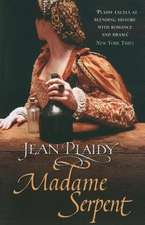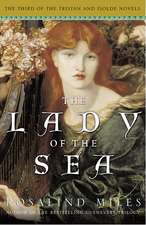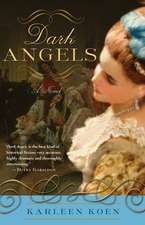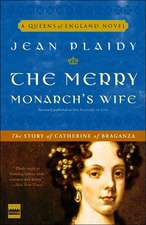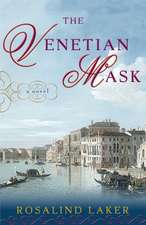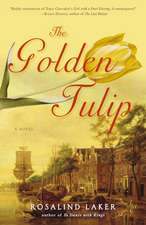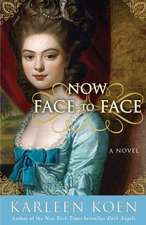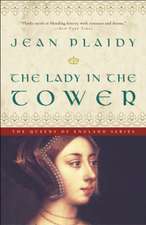The Queen's Secret: Queens of England
Autor Jean Plaidyen Limba Engleză Paperback – 31 mar 2007
With Joan of Arc inciting the French to overthrow English rule, Katherine’s loyalty to her adopted homeland of England became a matter of intense suspicion. Katherine had brought her dowry and borne her heir; what use was she to England? It was decreed that she would live out her remaining years alone, far from the seat of power. But no one, not even Katherine herself, could have anticipated that she would fall in love with and secretly marry one of her guardians, Owen Tudor—or that a generation later, their grandson would become the first king of the great Tudor dynasty.
Preț: 105.29 lei
Nou
Puncte Express: 158
Preț estimativ în valută:
20.15€ • 20.96$ • 16.63£
20.15€ • 20.96$ • 16.63£
Carte disponibilă
Livrare economică 25 martie-08 aprilie
Preluare comenzi: 021 569.72.76
Specificații
ISBN-13: 9781400082520
ISBN-10: 1400082528
Pagini: 403
Dimensiuni: 134 x 201 x 23 mm
Greutate: 0.31 kg
Ediția:Pbk.
Editura: Three Rivers Press (CA)
Seria Queens of England
ISBN-10: 1400082528
Pagini: 403
Dimensiuni: 134 x 201 x 23 mm
Greutate: 0.31 kg
Ediția:Pbk.
Editura: Three Rivers Press (CA)
Seria Queens of England
Notă biografică
Jean Plaidy is the pen name of the prolific English author Eleanor Hibbert, also known as Victoria Holt. Her novels have sold more than 14 million copies worldwide.
Extras
THE HOTEL DE ST.-PAUL
My earliest recollections are of that drafty and comfortless mansion, the Hotel de St.-Paul, in which, at that time, was incarcerated the man who was known throughout France as Charles the Mad.
There were six of us children living there: Louis, Jean, Marie, Michelle, myself and baby Charles. We had been put there because our mother did not know what to do with us, and as she had no great interest in our existence, the best thing seemed to her to be to shut us away.
Charles was just over a year younger than I. We all felt tender toward him because he was the baby and used to toddle after us with a rather bewildered look on his little face which was appealing. In truth, we were all rather bewildered.
Moreover, we were often hungry because there never seemed enough food to go around. The soup grew thinner every day until it was more like water. Louis used to ask for more. He was more important than the rest of us because he was the Dauphin--and he felt that entitled him to privileges.
He was promptly told that there was no more, so that was the end of the matter.
We had a governess who was always whispering to the nurse. "It's a shame and a scandal," she used to say. "Poor little things . . . and her going on as she does."
We listened avidly. We knew there was something odd about the place and we--at least the little ones--were quite unaware of what it was. Louis might have known something and he might have whispered it to Jean, but they were the eldest and boys. We were the young ones . . . and girls at that--with the exception of Charles, who was only a baby.
Marie was different from the rest of us. When we complained about being cold and hungry she would say: "It is God's will. We must accept what He gives us and be grateful to Him."
"How can you be grateful for what you do not have?" asked Michelle.
"If you do not have it, it is God's will that you should not," insisted Marie, "and we must all be grateful to Him."
I wished I could have been like Marie. It must be wonderful to feel there was something virtuous about being cold and hungry.
While the rest of us shivered in bed at night, even after having covered ourselves with everything we could find to keep ourselves warm, Marie would be kneeling by the bed, her hands and feet blue with the cold, thanking God.
Marie was different from the rest of us, and it was Michelle and I who were the closer friends.
One day stands out more clearly in my memory of those early days than any other.
It was winter--always to be dreaded for there was never enough wood to keep the fires going, and to be cold and hungry is so much worse than merely being hungry.
I did not realize it at the time, but it must have seemed very strange to our nurse and governess and the few attendants who were in the Hotel that, although we lived in such misery, the days were conducted as though our upbringing was the normal one for children of our rank.
We had our lessons every day; and on this occasion we were all seated at the table in the schoolroom and our governess was attempting to teach us, when suddenly the door opened and a strange creature stood there.
We children all stared at him in wonder.
He was very pale and his hair was in wild disorder. He wore an elaborately embroidered jacket, the splendor of which was impaired by a tear in the sleeve and stains down the front.
Our governess gave a little start and for a few seconds seemed uncertain what to do. Then she rose to her feet and bowed with great respect.
We children all sat staring at the intruder.
I caught my breath in terror when he approached the table for he was truly an alarming sight.
"My children," he began, and I noticed at once that he had one of the most musical voices I had ever heard.
Louis surprised me. He must have suddenly realized who the man was, for he rose from his chair and knelt before him.
The man stared down at him. He put out a hand and touched Louis's head; and I saw the tears running down his sunken cheeks.
"You are Charles," he said, in his beautiful voice. "Charles the Dauphin."
"No, Sire," replied Louis. "I am Louis the Dauphin."
"But Charles . . ."
"Charles is our younger brother now, Sire."
"And what of Charles . . . Dauphin Charles . . . ?"
"He is dead, Sire. He was ill . . . and he died."
The man stared ahead of him and his lips trembled. He smiled suddenly and said: "And you . . . Louis . . . you are now the Dauphin."
"Yes, Sire."
"Louis . . . when did you last see your mother?"
"I do not remember. It was a long time ago."
"My child, I have been ill . . . but I am better now. Yes. I shall be better now." He looked at us children sitting there at the table watching this scene in bewilderment. He held out a hand to us.
We looked questioningly at our governess, who nodded to us, implying that we should rise and go to him.
He looked at us all in turn.
At length his eyes rested on me. "And you, little one?" I was surprised that I was no longer afraid of him.
"I am Katherine," I said.
"Katherine, my dear child . . . God bless you."
He turned to the governess. "How long have the children been living here . . . like this?"
She told him when we had come.
"These are the Children of France," he said. "It is unbelievable that they should live so."
"We were sent here, Sire. We have done our best."
"I know that well," he replied. "Now . . . it will be different. Everything that is needed will be sent. I shall command it to be done and there will be no delay."
I remember no more of that scene, but I had learned something. The mad man of the Hotel de St.-Paul was our father and the King of France.
For several weeks after that we were warm and no longer hungry. New clothing came for us and there were fires in all the grates. There was plenty to eat. Life took on a different style.
Marie said: "Our prayers have been answered. God is good to us."
I heard the governess say to the nurse: "I pray God the King stays sane."
Her prayers were not answered for after a few months of good living, a carriage arrived at the door of the Hotel. It brought our father. He had become the wild man again, and several strong men were needed to guard him as they brought him in.
We heard his shouting. He cried out that he was made of glass and that he was going to shatter into a thousand pieces.
I tried to visualize a glass man. I could not believe our father could be that.
I heard him call out: "I am unworthy. I do not deserve to live. Shoot me, I beg of you."
I was deeply puzzled and after awhile the old bad times returned. It became a way of life and we accepted it as normal, as children do.
That was how it was in those days for us royal children in the Hotel de St.-Paul.
When I was a little older, I realized that I had been unfortunate to be born at a time when my country was in a more desperate decline than it had ever been--and I hope will ever be again.
I ask myself where it began, and I think, if I am completely frank, I must say that it started with my father's marriage. But perhaps it was even before that, for, as I learned so much later, my father's mother, Joan of Bourbon, who had been a good wife and mother and cared greatly for her children, suffered from periodic bouts of madness; and it seemed that she had passed this malady on to my father.
Still, I am sure his marriage did nothing to help him, and at least that was responsible for much of the trouble which arose in our country. Perhaps it is ungrateful to blame the mother who brought one into the world, but many people did blame her. So why should not I? The Bible says, "Honor thy father and thy mother," but how could I honor Isabeau of Bavaria, when I think I came near to hating her?
I saw very little of her during my childhood. There were so many of us that I believe she found it difficult to remember who we all were. It was only when we could be of use to her that she showed an interest in us. For the rest . . . we could be shut away in the Hotel de St.-Paul, to be joined by our father during his bouts of insanity. I think there were fourteen of us, but I am not sure, because many of us did not survive birth.
My two eldest sisters, Isabelle and Jeanne, had pleased her because they had made advantageous marriages--and that was, of course, the fate intended for us all. Jeanne had married the powerful Duke of Brittany when she was about six, and had been sent to him to be brought up away from the licentious Court of France as a worthy little Breton. Isabelle had made an even more brilliant match; she had been sent to England to marry King Richard, and although only eight years old had become Queen of England.
So it was only when we were needed to forge some alliance that we were important to our mother. For the most part we could be left in obscurity, looked after by servants who were fond enough of us to stay and care for us, even though they were not always paid for their services.
She was very beautiful, our mother. And she had more than beauty. Her skin was very white, her large dark eyes luminous, her dark hair abundant and curly; and she had perpetual vitality. Much as I hated and feared her, I was aware of her allure which, as I grew older, I realized lay in an insatiable sensuality. It drew men to her even though they knew it could destroy them. She was like a siren singing on the rocks calling sailors to their destruction. They knew it and yet they could not resist, for she was irresistible, even to the most austere.
As soon as my father had seen her he had become desperately enamored of her and determined to marry her, which was just what those about him wanted, for she had been brought from Bavaria for that purpose. She had been fourteen years old at the time. He was about seventeen.
My poor father! My heart still overflows with pity for him. When we grew to know him, during his lucid periods, we all loved him. We used to be very distressed when we heard him, shouting that he was made of glass and would break into a thousand pieces.
Writing of it now, it seems incredible that members of the Royal House of Valois, the family of the reigning King, the Dauphin of France and his sisters and brothers could be living in conditions such as those prevailing in garrets in the back streets of Paris. But it was true--the only difference being that we were living in apartments which had been grand once if they were now shabby . . . and were probably more drafty than any attic in the slums.
My father had been at a disadvantage from the beginning, for he had been only twelve years old when he came to the throne. His father, known as Charles the Wise for obvious reasons, had always feared that his son might inherit the crown before he was of an age to govern.
Regencies brought trouble, said Charles the Wise. It meant that two or three ambitious men would be jostling for power--more concerned with doing good to themselves than to the country. He lowered the age of majority to fourteen, thinking he might live long enough to see his son reach that age.
My grandfather, though a wise man, was not a healthy one. When he was a very young man, his cousin, known as Charles the Bad, had attempted to poison him, and although the attempt had failed, the King had never fully regained his health, though with Joan of Bourbon he did have nine children, only three of whom survived infancy. Joan was the one who suffered from insanity.
Alas, Charles the Wise, as he had feared, died before his son, my father, reached his majority; and of course he was right when he said that regencies caused trouble.
My father was immediately taken in hand by his three uncles, the Dukes of Anjou, Berry and Burgundy. There was one other uncle who joined with them--his mother's brother, the Duke of Bourbon. They were all ambitious men and for a short time they governed in a manner calculated to bring most profit to themselves.
Those counselors whom Charles the Wise had gathered together to assist him in the government of the country were immediately dismissed. That was the beginning of the trouble, because the uncles--always short of money--revived old taxes like the fouage and the gabelle--the hearth and salt taxes--which had always been unpopular; and the inevitable riots followed.
My father had greatly admired his father and had wanted to be like him. He loved his country, but by this time he was married to Isabeau and was coming more and more under her spell. She laughed at his seriousness, teased him and told him he should be more like his brother, Louis of Orleans. She wanted gaiety, extravagant parties, balls and masques at which she could appear in elaborate and sensational gowns. In this she was aided and urged to great extravagance by my father's brother, Louis of Orleans, who was very handsome, dashing, witty, fascinating . . . and ambitious. He must have summed up the situation. My father wanted to be a good king, to follow his father's methods . . . but alas, even more he wanted to please his wife.
Knowing my father and mother, I could well imagine the scenes between them: how she cajoled him; how he tried to resist; how she, with Louis of Orleans at her elbow, laughed at the serious young king; how she tempted him and how he succumbed.
My earliest recollections are of that drafty and comfortless mansion, the Hotel de St.-Paul, in which, at that time, was incarcerated the man who was known throughout France as Charles the Mad.
There were six of us children living there: Louis, Jean, Marie, Michelle, myself and baby Charles. We had been put there because our mother did not know what to do with us, and as she had no great interest in our existence, the best thing seemed to her to be to shut us away.
Charles was just over a year younger than I. We all felt tender toward him because he was the baby and used to toddle after us with a rather bewildered look on his little face which was appealing. In truth, we were all rather bewildered.
Moreover, we were often hungry because there never seemed enough food to go around. The soup grew thinner every day until it was more like water. Louis used to ask for more. He was more important than the rest of us because he was the Dauphin--and he felt that entitled him to privileges.
He was promptly told that there was no more, so that was the end of the matter.
We had a governess who was always whispering to the nurse. "It's a shame and a scandal," she used to say. "Poor little things . . . and her going on as she does."
We listened avidly. We knew there was something odd about the place and we--at least the little ones--were quite unaware of what it was. Louis might have known something and he might have whispered it to Jean, but they were the eldest and boys. We were the young ones . . . and girls at that--with the exception of Charles, who was only a baby.
Marie was different from the rest of us. When we complained about being cold and hungry she would say: "It is God's will. We must accept what He gives us and be grateful to Him."
"How can you be grateful for what you do not have?" asked Michelle.
"If you do not have it, it is God's will that you should not," insisted Marie, "and we must all be grateful to Him."
I wished I could have been like Marie. It must be wonderful to feel there was something virtuous about being cold and hungry.
While the rest of us shivered in bed at night, even after having covered ourselves with everything we could find to keep ourselves warm, Marie would be kneeling by the bed, her hands and feet blue with the cold, thanking God.
Marie was different from the rest of us, and it was Michelle and I who were the closer friends.
One day stands out more clearly in my memory of those early days than any other.
It was winter--always to be dreaded for there was never enough wood to keep the fires going, and to be cold and hungry is so much worse than merely being hungry.
I did not realize it at the time, but it must have seemed very strange to our nurse and governess and the few attendants who were in the Hotel that, although we lived in such misery, the days were conducted as though our upbringing was the normal one for children of our rank.
We had our lessons every day; and on this occasion we were all seated at the table in the schoolroom and our governess was attempting to teach us, when suddenly the door opened and a strange creature stood there.
We children all stared at him in wonder.
He was very pale and his hair was in wild disorder. He wore an elaborately embroidered jacket, the splendor of which was impaired by a tear in the sleeve and stains down the front.
Our governess gave a little start and for a few seconds seemed uncertain what to do. Then she rose to her feet and bowed with great respect.
We children all sat staring at the intruder.
I caught my breath in terror when he approached the table for he was truly an alarming sight.
"My children," he began, and I noticed at once that he had one of the most musical voices I had ever heard.
Louis surprised me. He must have suddenly realized who the man was, for he rose from his chair and knelt before him.
The man stared down at him. He put out a hand and touched Louis's head; and I saw the tears running down his sunken cheeks.
"You are Charles," he said, in his beautiful voice. "Charles the Dauphin."
"No, Sire," replied Louis. "I am Louis the Dauphin."
"But Charles . . ."
"Charles is our younger brother now, Sire."
"And what of Charles . . . Dauphin Charles . . . ?"
"He is dead, Sire. He was ill . . . and he died."
The man stared ahead of him and his lips trembled. He smiled suddenly and said: "And you . . . Louis . . . you are now the Dauphin."
"Yes, Sire."
"Louis . . . when did you last see your mother?"
"I do not remember. It was a long time ago."
"My child, I have been ill . . . but I am better now. Yes. I shall be better now." He looked at us children sitting there at the table watching this scene in bewilderment. He held out a hand to us.
We looked questioningly at our governess, who nodded to us, implying that we should rise and go to him.
He looked at us all in turn.
At length his eyes rested on me. "And you, little one?" I was surprised that I was no longer afraid of him.
"I am Katherine," I said.
"Katherine, my dear child . . . God bless you."
He turned to the governess. "How long have the children been living here . . . like this?"
She told him when we had come.
"These are the Children of France," he said. "It is unbelievable that they should live so."
"We were sent here, Sire. We have done our best."
"I know that well," he replied. "Now . . . it will be different. Everything that is needed will be sent. I shall command it to be done and there will be no delay."
I remember no more of that scene, but I had learned something. The mad man of the Hotel de St.-Paul was our father and the King of France.
For several weeks after that we were warm and no longer hungry. New clothing came for us and there were fires in all the grates. There was plenty to eat. Life took on a different style.
Marie said: "Our prayers have been answered. God is good to us."
I heard the governess say to the nurse: "I pray God the King stays sane."
Her prayers were not answered for after a few months of good living, a carriage arrived at the door of the Hotel. It brought our father. He had become the wild man again, and several strong men were needed to guard him as they brought him in.
We heard his shouting. He cried out that he was made of glass and that he was going to shatter into a thousand pieces.
I tried to visualize a glass man. I could not believe our father could be that.
I heard him call out: "I am unworthy. I do not deserve to live. Shoot me, I beg of you."
I was deeply puzzled and after awhile the old bad times returned. It became a way of life and we accepted it as normal, as children do.
That was how it was in those days for us royal children in the Hotel de St.-Paul.
When I was a little older, I realized that I had been unfortunate to be born at a time when my country was in a more desperate decline than it had ever been--and I hope will ever be again.
I ask myself where it began, and I think, if I am completely frank, I must say that it started with my father's marriage. But perhaps it was even before that, for, as I learned so much later, my father's mother, Joan of Bourbon, who had been a good wife and mother and cared greatly for her children, suffered from periodic bouts of madness; and it seemed that she had passed this malady on to my father.
Still, I am sure his marriage did nothing to help him, and at least that was responsible for much of the trouble which arose in our country. Perhaps it is ungrateful to blame the mother who brought one into the world, but many people did blame her. So why should not I? The Bible says, "Honor thy father and thy mother," but how could I honor Isabeau of Bavaria, when I think I came near to hating her?
I saw very little of her during my childhood. There were so many of us that I believe she found it difficult to remember who we all were. It was only when we could be of use to her that she showed an interest in us. For the rest . . . we could be shut away in the Hotel de St.-Paul, to be joined by our father during his bouts of insanity. I think there were fourteen of us, but I am not sure, because many of us did not survive birth.
My two eldest sisters, Isabelle and Jeanne, had pleased her because they had made advantageous marriages--and that was, of course, the fate intended for us all. Jeanne had married the powerful Duke of Brittany when she was about six, and had been sent to him to be brought up away from the licentious Court of France as a worthy little Breton. Isabelle had made an even more brilliant match; she had been sent to England to marry King Richard, and although only eight years old had become Queen of England.
So it was only when we were needed to forge some alliance that we were important to our mother. For the most part we could be left in obscurity, looked after by servants who were fond enough of us to stay and care for us, even though they were not always paid for their services.
She was very beautiful, our mother. And she had more than beauty. Her skin was very white, her large dark eyes luminous, her dark hair abundant and curly; and she had perpetual vitality. Much as I hated and feared her, I was aware of her allure which, as I grew older, I realized lay in an insatiable sensuality. It drew men to her even though they knew it could destroy them. She was like a siren singing on the rocks calling sailors to their destruction. They knew it and yet they could not resist, for she was irresistible, even to the most austere.
As soon as my father had seen her he had become desperately enamored of her and determined to marry her, which was just what those about him wanted, for she had been brought from Bavaria for that purpose. She had been fourteen years old at the time. He was about seventeen.
My poor father! My heart still overflows with pity for him. When we grew to know him, during his lucid periods, we all loved him. We used to be very distressed when we heard him, shouting that he was made of glass and would break into a thousand pieces.
Writing of it now, it seems incredible that members of the Royal House of Valois, the family of the reigning King, the Dauphin of France and his sisters and brothers could be living in conditions such as those prevailing in garrets in the back streets of Paris. But it was true--the only difference being that we were living in apartments which had been grand once if they were now shabby . . . and were probably more drafty than any attic in the slums.
My father had been at a disadvantage from the beginning, for he had been only twelve years old when he came to the throne. His father, known as Charles the Wise for obvious reasons, had always feared that his son might inherit the crown before he was of an age to govern.
Regencies brought trouble, said Charles the Wise. It meant that two or three ambitious men would be jostling for power--more concerned with doing good to themselves than to the country. He lowered the age of majority to fourteen, thinking he might live long enough to see his son reach that age.
My grandfather, though a wise man, was not a healthy one. When he was a very young man, his cousin, known as Charles the Bad, had attempted to poison him, and although the attempt had failed, the King had never fully regained his health, though with Joan of Bourbon he did have nine children, only three of whom survived infancy. Joan was the one who suffered from insanity.
Alas, Charles the Wise, as he had feared, died before his son, my father, reached his majority; and of course he was right when he said that regencies caused trouble.
My father was immediately taken in hand by his three uncles, the Dukes of Anjou, Berry and Burgundy. There was one other uncle who joined with them--his mother's brother, the Duke of Bourbon. They were all ambitious men and for a short time they governed in a manner calculated to bring most profit to themselves.
Those counselors whom Charles the Wise had gathered together to assist him in the government of the country were immediately dismissed. That was the beginning of the trouble, because the uncles--always short of money--revived old taxes like the fouage and the gabelle--the hearth and salt taxes--which had always been unpopular; and the inevitable riots followed.
My father had greatly admired his father and had wanted to be like him. He loved his country, but by this time he was married to Isabeau and was coming more and more under her spell. She laughed at his seriousness, teased him and told him he should be more like his brother, Louis of Orleans. She wanted gaiety, extravagant parties, balls and masques at which she could appear in elaborate and sensational gowns. In this she was aided and urged to great extravagance by my father's brother, Louis of Orleans, who was very handsome, dashing, witty, fascinating . . . and ambitious. He must have summed up the situation. My father wanted to be a good king, to follow his father's methods . . . but alas, even more he wanted to please his wife.
Knowing my father and mother, I could well imagine the scenes between them: how she cajoled him; how he tried to resist; how she, with Louis of Orleans at her elbow, laughed at the serious young king; how she tempted him and how he succumbed.
Descriere
The Queens of England series is the quintessence of Plaidy--and the seventh installment features the scandalous wife and widow of Henry V. After a miserable childhood, Princess Katherine of France is delighted to find herself married to the handsome young King of England. But after Henry's death, she accepts the attentions of a Welsh knight, an act of treason with far-reaching results.

